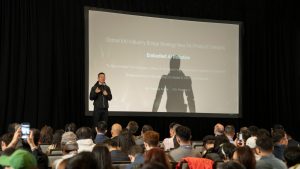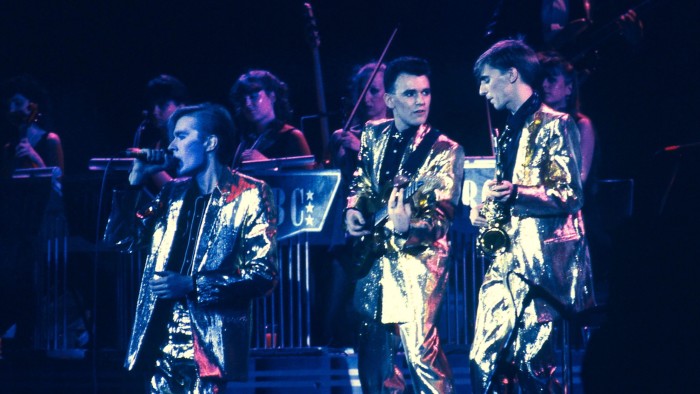Summarize this content to 2000 words in 6 paragraphs in Arabic Unlock the Editor’s Digest for freeRoula Khalaf, Editor of the FT, selects her favourite stories in this weekly newsletter.“Sheffield was a great place to be a bohemian,” says Martin Fry, lamé-suited frontman of ABC, the pop-soul futurists whose early-1980s synth anthems crystallised the new decade’s spirit of possibility. “Ten pence would get you across the whole city on the bus.” At the height of Fry’s fame it would have been almost impossible to imagine him on public transport. ABC were the platinum-selling counterpoint to punk’s nihilism. But behind their success lay hard times growing up in the South Yorkshire city, once the steel manufacturing capital of the world, yet by the late-20th century set in decline. As Jamie Taylor points out in his new book on Sheffield’s contribution to pop music in the 1970s and early 1980s, “When stainless steel is made, the durable sheen of beauty and perfection can blind one to the strain, muck and wreckage that is essential to its creation.” London, Liverpool and Manchester dominate the history of British pop. But what Taylor calls “the Sheffield space age” produced three bands that achieved massive sales and international fame: The Human League, Heaven 17 and ABC. “Don’t You Want Me”, the Human League’s 1981 single, sold 1mn copies in the US alone. Other Sheffield acts changed the cultural climate: electro-industrial Cabaret Voltaire were a cult success (John Hughes’s slacker-hero Ferris Bueller has a poster of the band’s 1984 album Micro-Phonies on his wall); later in the decade and into the 1990s, Pulp would elevate Britpop with irony and intellect. There are odd omissions. In this telling, women are mostly mothers banging on about proper jobs or cleaning up after band practicesBut Taylor is less interested in heydays than early years. Studio Electrophonique chronicles how Sheffield’s achievements were born in “the shadowlands between lost industry and desperate bohemia”.Publicly funded institutions underpinned Sheffield’s chart-busting success. Taylor explores a network of young people traversing free art colleges, libraries, youth theatres and housing and transport heavily subsidised by a left-wing local authority. Then there were recording studios in derelict factories, live venues and factory jobs that funded artistic visions — “graft” is Taylor’s word. A generation of artists — Fry, Martyn Ware of Heaven 17, Phil Oakey of The Human League and Jarvis Cocker of Pulp among them — had little money, musical training or connections. They did have imaginative freedom and a confluence of support. Two resources were significant. The first was Studio Electrophonique, which despite its glamorous, enigmatic name was a recording facility in a suburban council house assembled by a hobbyist. The book devotes much space to Ken Patten, its owner, an ex-RAF man and middle-aged home recording enthusiast who in the 1970s ran an affordable service with remarkable ingenuity for anyone in need of a demo tape. The second was Meatwhistle, a youth theatre group that mixed serious plays with dada experimentation (Oakey and Ware were among its alumni). It staged some ambitious work — Marat/Sade, Peter Weiss’s notoriously violent 1964 play set in a mental asylum during the French Revolution, was an early production. It also spawned all kinds of anarchy. One event featured Musical Vomit, a proto-punk band spewing vegetable soup down a spotlit toilet. Glenn Gregory, later of Heaven 17, described Meatwhistle as “a place of freedom and fun . . . eye-opening, life-affirming and just brilliant”. Heaven 17’s satirising of yuppie lifestyles a decade later hint at its lasting influence.This is an insanely detailed book. Do we need to know Roger Quail, drummer with Clock DVA, failed to win a Talking Heads sweatshirt in a raffle? Probably not. But it is published in the spirit of documenting obscure histories by the British Pop Archive, part of Manchester university, which perhaps explains Taylor’s devotion to minutiae. There are odd omissions. Women are mostly missing: Meatwhistle was co-founded by artist Veronica Wilkinson, whose radical ideas are never developed. I would have liked more about her. Joanne Catherall and Susan Ann Sulley, the deadpan vocal duo who brought glamour to the Human League, are barely mentioned. In this telling of Sheffield pop history, women are mostly mothers banging on about proper jobs or cleaning up after band practices. And Taylor never mentions Arctic Monkeys, another international success, perhaps the last gasp of Sheffield’s musical flowering. But the book’s strength is its bringing to life the infrastructure, largely publicly funded, that supported an unlikely bohemia that led to worldwide success. Most of that is gone, and will probably never return.Studio Electrophonique: The Sheffield Space Age, from The Human League to Pulp by Jamie Taylor Manchester University Press £12.99/$19.95, 304 pages Join our online book group on Facebook at FT Books Café and follow FT Weekend on Instagram and X
رائح الآن
rewrite this title in Arabic Studio Electrophonique by Jamie Taylor — an insanely detailed pop history
مال واعمال
مواضيع رائجة
النشرة البريدية
اشترك للحصول على اخر الأخبار لحظة بلحظة الى بريدك الإلكتروني.
© 2026 جلوب تايم لاين. جميع الحقوق محفوظة.










